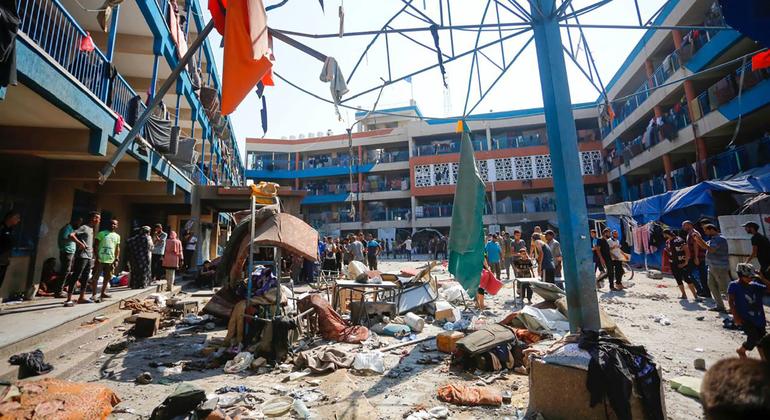

Stéphane Dujarric said the UN is working to confirm reports that UNRWA staff were killed in the attack on the New Nuseirat school, a site that had previously been deconflicted with the Israeli authorities.
“This is the fifth strike on the same location in the past 11 months,” he said.
Polio campaign rolls on
Meanwhile, health workers continue efforts to vaccinate young children in northern Gaza against polio.
More than 81,600 boys and girls were inoculated against the disease as of Tuesday, according to preliminary data from the UN World Health Organization (WHO).
Polio was detected in Gaza in June and UN agencies and partners launched a two-round campaign this month to inoculate over 640,000 children under the age of 10 against the disease.
So far, nearly 528,000 have been reached. [I think this is only the first round, maybe good to mention that]
“More than 230 teams are on the ground trying to reach all children under the age of 10 with the first batch of the polio vaccination,” Mr. Dujarric said, adding “they will need to do this again in four weeks.”
Health system in tatters
The campaign is taking place as Gaza’s healthcare system remains in dire condition.
The UN Office for the Coordination of Humanitarian Affairs (OCHA) and partners said half of all essential medicines are not available in the enclave, while primary health centres are facing critically low levels of insulin.
Additionally, routine vaccinations to protect infants from tuberculosis, diphtheria, tetanus and pertussis, are also nearly exhausted.
West Bank military operation
The UN and partners also continue to support Palestinian civilians in the West Bank who have been affected by the 10-day Israeli security operation in Jenin and Tulkarm, as well as adjacent refugee camps.
This includes delivery of food and water, with OCHA coordinating efforts to provide additional assistance.
Over the weekend, the Office together with UNRWA and other humanitarian partners began assessing the needs of Palestinians affected by the operation.
Damage and displacement
More than 620 people, over a third of them children, remain displaced, and some 2,400 housing units have been damaged, with more than 100 rendered uninhabitable.
During the operation, more than 2.6 kilometres of water and sewage networks in the Tulkarm and Nur Shams refugee camps were bulldozed, severely hindering the delivery of essential services.
As a result, more than 33,000 residents have been coping with water cuts and sewage flooding over the past two weeks.